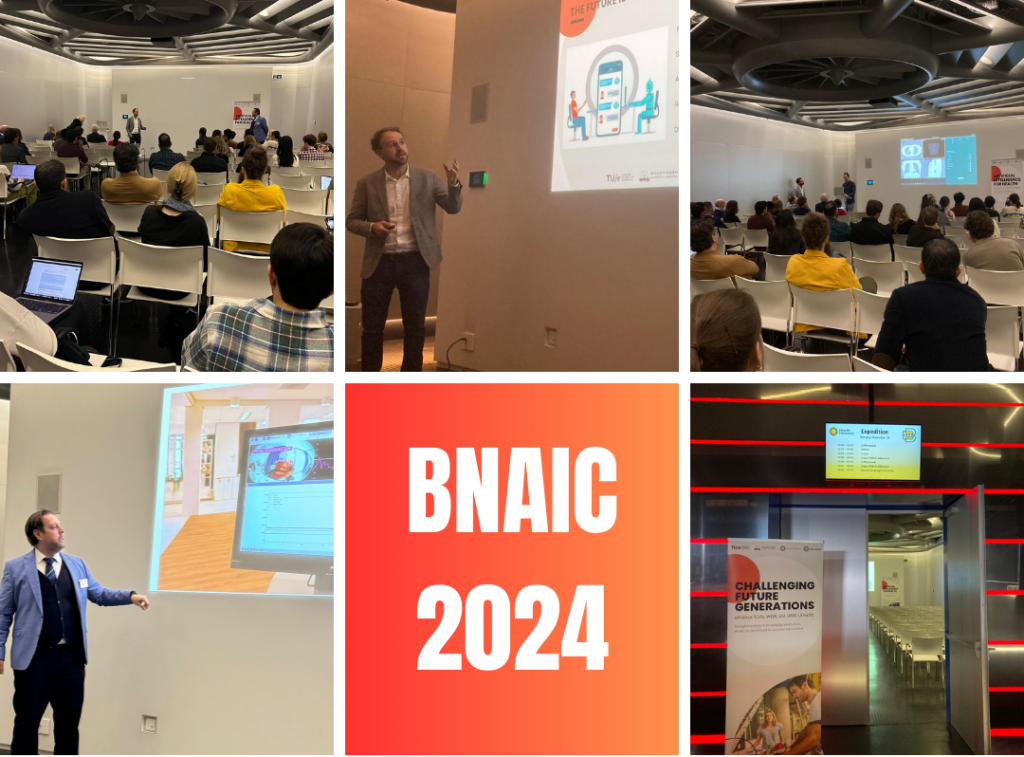We look back on a successful and well-attended session at the BNAIC2024 conference. Our Impact Track focused on how AI and Machine Learning are shaping real-world applications and driving innovation in health.
The session featured several duo-presentations, where researchers and industry partners shared how they collaborate in public-private partnerships to implement AI solutions. These presentations highlighted diverse approaches and perspectives, broadening our understanding and offering a clearer picture of AI’s full potential and its impact on society. A short overview of the day:

Jaap Trappenburg coordinator of the alliance TU/e-WUR-UU-UMCU shared the alliance’s collaborative vision for AI-driven innovation.
Use of AI in consultation reports
Sjaak Brinkkemper (UU) and Joep Wegstapel (Verticai)talked about reducing administrative burden in healthcare with ontological conversation interpretation based on generative AI. The administrative burden of routine processes in professional communication is high, yet client consultation reports are essential. To address this challenge, the Care2Report research program was launched which aims to enable generative reporting through multimodal recording (audio, video, Bluetooth) of consultations. They presented the objectives of the Care2Report research program, its linguistic pipelines, the current functional and technical architecture, and a live demonstration.
Furthermore they showcased (i) the creation of an ontology to align with conversation audio transcripts, (ii) advancements in prompt engineering, and (iii) an action recognition model using convolutional neural networks. They concluded with an outlook on ongoing research projects and experimental applications in healthcare, law enforcement, and municipal government.
Precision surgery with AI
Amir Sadeghi (cardiothoracic surgeon at UMC Utrecht) and Chris Hordijk (MedicalVR) talked about navigating robotic-assisted thoracic surgery, demonstrating how XR and AI are precision instruments for the future. By utilizing artificial intelligence (AI) for advanced imaging analysis and virtual reality or augmented reality (AR) for surgical visualization, the team aims to improve surgical precision and patient safety. The academic hospital provides clinical expertise and patient data, while the medtech startup delivers technological innovations. This collaboration accelerates the development of customized 3D planning software and intraoperative AR tools, which provide real-time support to surgical teams and make operations more efficient.
Real-life impact
Duco Veen (UU, DISC-AI-Lab) and Tim Christen (Kennisinstituut – Federatie Medisch Specialisten) demonstrated how real-life collaboration changes research questions and directions. They explored the dynamic interplay between real-world application and research on AI-methods. They looked at ASReview’s role in evidence synthesis for medical guideline creation, the impact of partner collaboration on academic inquiry, and practical challenges in implementation. And discussed how outreach shapes ASReview’s evolution, turning practical insights into research inspiration, to enhance its functionality and real-life impact.
Remote patient monitoring with wearables
Martine Breteler (UMCU) talked about how researchers from UMCU and TU/e are advancing remote patient monitoring (RPM) by integrating AI to make wearables more context-aware. The goal is to develop “smart alerts” that reduce false positives by identifying when a patient genuinely requires attention, thus lightening the workload for healthcare providers. These wearables collect health data, such as heart rate and blood pressure, allowing patients to recover at home while healthcare staff monitor for early signs of deterioration. The team is also refining prompt timing for patient responses and is planning a “Living Lab for Remote Monitoring” in 2025, where they can test and improve RPM workflows in a simulated environment. This initiative, part of the EWUU Alliance, combines clinical expertise from UMCU with TU/e’s technical knowledge, aiming for practical, sustainable improvements in healthcare workflows.
AI and nutrition
Guido Camps (WUR, AI Lab for Precision Health, Nutrition & Behavior) gave a keynote on innovating nutrition through AI. Nutrition as well as nutritional epidemiology is heavily dependent on accurate measurement intake. The current golden standard is based on questionnaires and manual recording, which are both prone to bias as well as error. AI in combination with sensors could partly mitigate this issue. In his talk he discussed state of the art solutions that were partly developed within the EWUU framework.
Additionally to these presentations, there was ample opportunity for networking and exploring new avenues for collaboration, fostering connections that could drive future innovation.